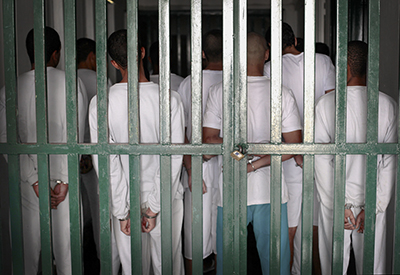Off on the wrong foot
 Adolescents at the former Caje detention center in Brasília
Adolescents at the former Caje detention center in Brasília
The first statement made by Yousseff Abou Chahin as head of the São Paulo Civil Police, defending longer sentences for young offenders, has been harshly criticized by human rights organizations. During the inauguration ceremony this Monday, January 5, in the presence of São Paulo’s new Public Security Secretary, Alexandre de Moraes, and the also recently appointed Military Police Commander, Ricardo Gambaroni, Chanin declared that minors “have a license to kill”.
But according to information from Senasp (National Public Security Department), adolescents aged 16 to 18 are responsible for just 0.9% of crimes in Brazil. Considering only murder and attempted murder, this figure falls to 0.5%.
As far as Conectas is concerned, Chahin’s position is indicative of a tendency by the new security officials to lengthen the time spent by young offenders in state custody. It also indicates their interest in solving problems with detention rather than expanding social welfare policies, in particular for black youth from poor neighborhoods – the main victims of violence.
Data released on the same day (January 5) by the Brazilian Public Security Forum reveal that, between 2007 and 2012, the number of murders of black youths increased 21.3% (the figure for white youths was down 5.5%). The report also identified that, of the nearly 30,000 young people murdered in 2012, 76.5% were black.
“It is a dangerous discourse, which will probably incite violence among civil and military police officers against young offenders. And it is an affront to the Child and Adolescent Act,” said Marcos Fuchs, associate director of Conectas. “Keeping young people detained for longer will never reduce violence. Claiming that violence is caused by young people is another absurdity. São Paulo’s new police chief has got off on the wrong foot,” he added.
Recent data from the Secretary-General of the Presidency of the Republic show that São Paulo, which is home to 36% of the Brazilian prison population, is the state with the fourth highest rate of youth incarceration – of people aged between 18 and 29 – in the adult system (1,044 for every 100,000 inhabitants). According to the same data, 38% of São Paulo’s prisoners are in this age bracket and 75% of the children and adolescents serving sentences are detained at Fundação Casa youth reform centers.
Listen below to an interview with Marcos Fuchs, associate director of Conectas, on the statements made by the new São Paulo police chief:
What the law says
The Constitution of 1988 determines, in article 227, that “it is the duty of the family, of society and of the State to ensure, as an absolute priority, that children and adolescents have the right to life, to health, to food, to education, to leisure, to have a profession, to culture, to dignity, to respect, to freedom and to family and community life”. It also establishes that “minors under eighteen years of age lack criminal capacity and shall be subject to the rules of special legislation”.
This criminal incapacity, however, does not mean impunity. Offenses committed by children and adolescents are covered in the Child and Adolescent Act (1990), as are the penalties applicable for each case.
The act is in compliance with the International Convention on the Rights of the Child (1989), which was ratified by Brazil in 1990. According to article 37 of this treaty, States Parties must ensure that “no child shall be deprived of his or her liberty unlawfully or arbitrarily”. It also states that “the arrest, detention or imprisonment of a child shall be in conformity with the law and shall be used only as a measure of last resort and for the shortest appropriate period of time”.
Click here to read five arguments by Conectas against lowering the age of criminal responsibility


